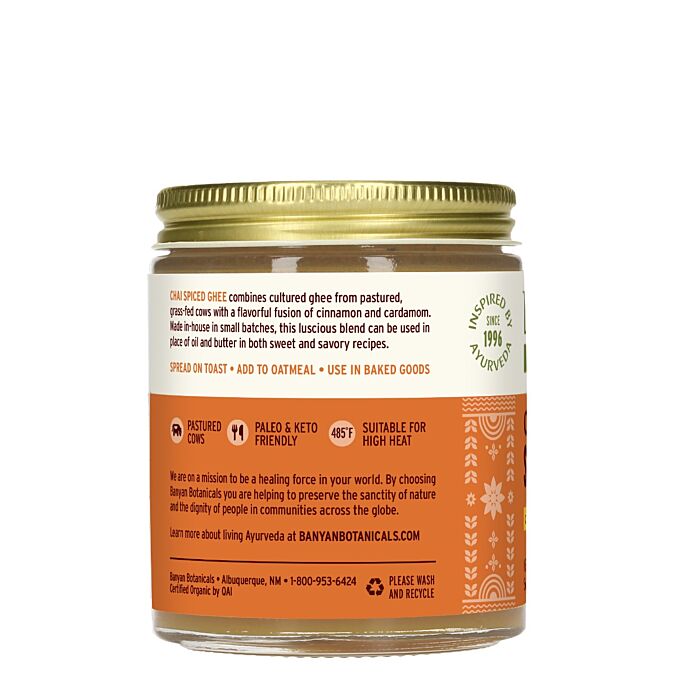Introduction
Ghee, a cherished culinary ingredient in many cultures, has earned a reputation not only for its rich flavor but also for its potential role in weight management. While it may seem counterintuitive to link a clarified butter to weight control, there’s more to this golden elixir than meets the eye. In this article, we’ll explore the intriguing connection between ghee and weight management, shedding light on how this traditional ingredient can play a positive role in maintaining a healthy weight.
Ghee, with its deep roots in culinary traditions across the globe, is not just about adding richness and flavor to your dishes; it also harbors a fascinating relationship with weight management that might defy common expectations. In delving deeper into this culinary treasure, we uncover a multifaceted character that can contribute positively to maintaining a healthy weight.
The Flavorful Paradox: At first glance, the idea of ghee aiding in weight management might appear contradictory, given its indulgent and savory nature. However, the paradox lies in the quality of the fats it contains. Ghee is predominantly composed of saturated fats, particularly short-chain fatty acids, which can be more easily metabolized by the body compared to long-chain fatty acids found in many other fats and oils.
Healthy Fats for Satiety: Ghee’s unique fatty acid profile may support weight management by promoting satiety. When consumed in moderation, the healthy fats in ghee can help you feel fuller for longer, reducing the urge for frequent snacking or overeating. This sense of fullness can lead to better portion control and ultimately aid in weight maintenance.
Steady Energy Release: Ghee is a source of sustained energy. Its fats are efficiently metabolized, providing a consistent and stable release of energy throughout the day. This steady energy can help curb cravings for quick, sugary fixes, which can contribute to weight gain over time.
Boosting Nutrient Absorption: Ghee’s richness extends to its role in enhancing nutrient absorption. It aids in the absorption of fat-soluble vitamins, such as vitamins A, D, E, and K, which are essential for overall health. By improving nutrient assimilation, ghee supports the body’s overall well-being, which can indirectly influence weight management.
Digestive Comfort: In Ayurvedic traditions, ghee is revered for its ability to soothe the digestive system. A well-functioning digestive system is crucial for efficient nutrient absorption and metabolism. By promoting digestive comfort, ghee indirectly supports the body in maintaining a healthy weight.
The Art of Moderation: As with any dietary component, moderation is key. While ghee can be a valuable ally in weight management, it should be incorporated into a balanced diet and lifestyle. It’s not a green light to indulge in excess, but rather an invitation to savor its unique qualities as part of a holistic approach to health.
In essence, ghee’s association with weight management is a nuanced and intriguing facet of its culinary and nutritional profile. It challenges preconceived notions about fats and demonstrates that, when consumed mindfully and in moderation, it can be a supportive element in maintaining a healthy weight. This article aims to unravel the layers of this connection, offering insights into how ghee, a cherished ingredient in various cultures, can contribute positively to your wellness journey.
To delve further into this matter, we encourage you to check out the additional resources provided here: Food Consumption and its impact on Cardiovascular Disease …
Before we delve into the relationship between ghee and weight management, let’s first understand what ghee is. Ghee is a form of clarified butter that has been used for centuries in Indian cooking and Ayurvedic medicine. It is prepared by simmering butter to remove water content and milk solids, leaving behind a pure and golden fat with a rich, nutty flavor. Ghee is prized for its high smoke point, longer shelf life, and potential health benefits.
nullIf you’d like to dive deeper into this subject, there’s more to discover on this page: Ghee Benefits for Skin: 9 Ways to Soothe Skin Woes

One of the factors that make ghee intriguing in the context of weight management is its unique nutritional composition. Ghee is primarily composed of saturated fats, which have been the subject of much debate and scrutiny in the past. However, it’s essential to recognize that not all saturated fats are created equal, and ghee contains a significant proportion of medium-chain fatty acids (MCFAs). Unlike long-chain fatty acids found in some other saturated fats, MCFAs are metabolized differently in the body.
One of the factors that make ghee intriguing in the context of weight management is its unique nutritional composition. Ghee is primarily composed of saturated fats, which have been the subject of much debate and scrutiny in the past. However, it’s essential to recognize that not all saturated fats are created equal, and ghee contains a significant proportion of medium-chain fatty acids (MCFAs). Unlike long-chain fatty acids found in some other saturated fats, MCFAs are metabolized differently in the body.
MCFAs, such as those found in ghee, are known for their distinct metabolic advantages. When you consume MCFAs, your body quickly transports them to the liver, where they are readily converted into energy. This efficient conversion process means that MCFAs are less likely to be stored as fat in the body, making ghee a potential ally in weight management efforts.
Furthermore, ghee’s unique composition can contribute to feelings of satiety and reduced calorie consumption. Research suggests that MCFAs may help increase the production of hormones responsible for promoting fullness and reducing appetite. When you feel satisfied for longer periods, you’re less likely to engage in excessive snacking or overeating, which can play a pivotal role in achieving and maintaining a healthy weight.
Another advantage of ghee in weight management is its low moisture content. Ghee is essentially pure butterfat with the water and milk solids removed. This absence of moisture makes it a stable cooking fat, ideal for sautéing and frying without the risk of splattering or burning. When you cook with ghee, it allows you to prepare delicious and satisfying meals with less oil, reducing overall calorie intake and potentially aiding in weight control.
It’s important to remember that while ghee can be a valuable component of a balanced diet for weight management, moderation is key. Like any calorie-dense food, excessive consumption of ghee can lead to weight gain if not accounted for within your overall caloric intake. Therefore, incorporating ghee sensibly as part of a well-rounded diet, along with regular physical activity, can help you harness its potential benefits for weight management while enjoying its rich, nutty flavor in various culinary creations.
To delve further into this matter, we encourage you to check out the additional resources provided here: Comparison between the Effect of Cow Ghee and Butter on Memory …

MCFAs in ghee are quickly absorbed by the liver, where they are converted into energy rather than being stored as fat. This efficient energy utilization may contribute to increased metabolism and potentially aid in weight management.
Indeed, the swift absorption of Medium-Chain Fatty Acids (MCFAs) found in ghee by the liver brings forth a fascinating aspect of how ghee might positively impact metabolism and assist in weight management.
Metabolism in the Spotlight: When you consume foods containing MCFAs, such as those found in ghee, these unique fatty acids take a fast-track journey to the liver. Unlike their long-chain counterparts, which need additional processing, MCFAs are like express tickets to energy production. This streamlined process is what makes MCFAs stand out in the context of metabolism.
Energy Conversion: Upon arrival in the liver, MCFAs are rapidly converted into energy. This means they don’t linger in the bloodstream or get stored as fat, unlike some other fats that require more intricate processing. Instead, MCFAs are utilized almost immediately, providing a quick and efficient source of fuel for the body.
The Calorie-Burning Potential: This swift conversion of MCFAs into energy has interesting implications for metabolism. The energy expenditure involved in processing MCFAs may lead to a slight increase in calorie burn, albeit modest. While this might not be a groundbreaking boost, every bit counts when it comes to weight management.
Satiety and Portion Control: Additionally, the satiating effect of ghee can’t be underestimated. When you incorporate ghee into your meals, it can help you feel fuller for longer periods, reducing the likelihood of overeating or snacking on calorie-laden treats between meals. This aspect of portion control can be a valuable ally in weight management.
A Balanced Approach: It’s important to remember that while MCFAs in ghee can contribute to efficient energy utilization and potentially aid in weight management, they’re not a magic solution for shedding pounds. Sustainable weight management involves a combination of factors, including a balanced diet, regular physical activity, and lifestyle choices.
Individual Variations: Keep in mind that everyone’s metabolism is unique, and the impact of ghee on weight management can vary from person to person. Factors such as age, genetics, activity level, and overall dietary habits all play a role in how your body responds to dietary fats like those in ghee.
Consult with a Professional: Before making significant changes to your diet, especially if you have specific weight management goals or health concerns, it’s advisable to consult with a healthcare professional or a registered dietitian. They can provide personalized guidance tailored to your individual needs and help you create a sustainable and effective weight management plan.
In conclusion, while the rapid conversion of MCFAs in ghee into energy is an intriguing aspect of its potential impact on metabolism and weight management, it’s just one piece of the puzzle. Incorporating ghee into a well-rounded, balanced diet and maintaining a healthy lifestyle that includes regular physical activity remains key to achieving and sustaining a healthy weight.
If you’d like to dive deeper into this subject, there’s more to discover on this page: 6 Myths About Ghee You Shouldn’t Believe Anymore – The Wellness …

Ghee is calorie-dense, and consuming it in moderation can help you feel full and satisfied. This can lead to reduced overall calorie intake, which is a fundamental aspect of weight management.
Ghee is a calorie-dense food item that has garnered attention for its potential benefits when incorporated into a balanced diet. When consumed in moderation, ghee can play a valuable role in promoting a sense of fullness and satisfaction. This unique characteristic of ghee can have a positive impact on your overall calorie intake, making it a valuable tool in the realm of weight management.
One of the key challenges in maintaining a healthy weight is controlling calorie consumption. Ghee, with its rich and indulgent flavor, can enhance the palatability of various dishes, making them more satisfying. When you feel full and content after a meal that includes ghee, you’re less likely to indulge in excessive snacking or overeat during subsequent meals.
By substituting less healthy fats or cooking oils with ghee in your recipes, you not only introduce a delicious twist to your meals but also reduce the overall calorie density of your diet. This reduction in calorie density can make it easier to stay within your daily calorie targets, a fundamental aspect of weight management.
Additionally, ghee contains essential fatty acids that are beneficial for overall health, and it can aid in nutrient absorption, further supporting your body’s nutritional needs. However, it’s crucial to remember that moderation is key. While ghee can be a valuable addition to your diet, excessive consumption can still lead to an excessive calorie intake, which may counteract its potential benefits.
In conclusion, incorporating ghee in moderation as part of a balanced diet can contribute to a feeling of fullness and satisfaction, ultimately assisting in the management of calorie intake. This, combined with its nutritional value, makes ghee a noteworthy ingredient in the pursuit of a healthier and well-balanced lifestyle.
To delve further into this matter, we encourage you to check out the additional resources provided here: Ghrelin: The ‘Hunger Hormone’ Explained

Ghee’s healthy fats can help stabilize blood sugar levels. When blood sugar remains steady, you’re less likely to experience cravings for sugary or high-calorie foods, which can support weight management efforts.
nullFor a comprehensive look at this subject, we invite you to read more on this dedicated page: Dietary fat: Know which to choose – Mayo Clinic

Ghee can be part of a balanced diet when consumed in appropriate quantities. Including it in your meals can add flavor and satiety, potentially reducing the desire for unhealthy snacks.
Ghee, often hailed as liquid gold in culinary circles, can indeed be a valuable addition to a well-balanced diet when consumed in moderation. Embracing this rich and flavorful clarified butter in your meals not only elevates the taste but also offers a range of potential health benefits.
One of the most appealing aspects of incorporating ghee into your diet is its ability to enhance the flavor of your dishes. Its nutty, slightly caramelized taste can transform even the simplest of meals into a gastronomic delight. Whether you’re sautéing vegetables, searing meats, or drizzling it over steamed rice, ghee’s subtle, yet distinct, flavor profile can elevate your culinary creations to new heights.
Beyond its gustatory pleasures, ghee also plays a role in promoting satiety, the feeling of fullness and satisfaction after a meal. When you include ghee in your diet, it contributes to the overall richness of your meals, making them more filling. As a result, you may find yourself less inclined to reach for unhealthy snacks or overindulge in your cravings between meals. This can be especially helpful for those striving to manage their weight or make healthier dietary choices.
Furthermore, ghee boasts a high smoke point, making it a superb cooking fat. It can withstand high temperatures without breaking down or emitting harmful compounds, unlike some other cooking oils. This stability makes it an excellent choice for various cooking methods, from frying to baking, ensuring that your meals are not only delicious but also prepared with a healthy cooking medium.
Incorporating ghee into your diet also brings with it a host of potential health advantages. Ghee is rich in fat-soluble vitamins like A, D, E, and K, which are essential for various bodily functions, including immune support and bone health. Additionally, it contains conjugated linoleic acid (CLA), a fatty acid with potential anti-inflammatory and weight management properties, although research on this topic is ongoing.
It’s important to note that while ghee can be a nutritious addition to your diet, moderation is key. Like any calorie-dense food, overconsumption can lead to unwanted weight gain. Therefore, it’s wise to use ghee judiciously and as part of a balanced diet that includes a variety of foods from all food groups.
In conclusion, ghee’s unique combination of flavor-enhancing qualities, satiety-promoting attributes, and potential health benefits make it a versatile and valuable component of a well-rounded diet. When used wisely, ghee can not only delight your taste buds but also contribute positively to your overall health and well-being.
To delve further into this matter, we encourage you to check out the additional resources provided here: Dietary fat: Know which to choose – Mayo Clinic

To leverage the potential benefits of ghee for weight management, consider these tips:
To leverage the potential benefits of ghee for weight management, consider these tips as your roadmap to a healthier and more balanced approach to your dietary habits:
Moderation is Key: Ghee is calorie-dense, so while it offers nutritional advantages, it’s essential to use it in moderation. Portion control is crucial to avoid excess calorie intake, which can hinder your weight management efforts. A little ghee goes a long way in enhancing flavor and nutrition in your meals.
Opt for Clarified Ghee: When incorporating ghee into your diet, choose high-quality, clarified ghee. This type of ghee has the milk solids removed, leaving behind the pure, healthy fats. Clarified ghee is not only more flavorful but also easier to digest.
Balanced Diet: Ghee should be part of a well-balanced diet that includes a variety of foods from different food groups. Use it to complement your vegetables, grains, and lean proteins. This ensures you receive a broad spectrum of nutrients while keeping your calorie intake in check.
Mindful Cooking: Ghee’s high smoke point makes it an excellent choice for cooking. Use it for sautéing, roasting, or frying, but do so mindfully. Being conscious of your cooking methods can help you reduce the overall amount of fat used in your dishes while still enjoying the flavor and benefits of ghee.
Pair with Fiber-Rich Foods: Combine ghee with fiber-rich foods like whole grains, legumes, and vegetables. This pairing can help control your appetite and keep you feeling full for longer, reducing the temptation to overeat.
Regular Exercise: Ghee can be a valuable source of energy for your workouts. Its medium-chain triglycerides provide readily available fuel for your muscles. When paired with regular exercise, ghee can support your fitness goals by aiding in performance and recovery.
Consult a Nutritionist: If you have specific weight management goals or dietary concerns, consider consulting a nutritionist or dietitian. They can provide personalized guidance on incorporating ghee into your diet while ensuring it aligns with your overall health objectives.
Listen to Your Body: Pay attention to how your body responds to ghee. Everyone’s metabolism and dietary needs are different. If you notice any adverse effects or unexpected changes in your weight, adjust your ghee consumption accordingly.
Stay Hydrated: Adequate hydration is essential for effective weight management. Drinking plenty of water can help your body process the fats and nutrients from ghee efficiently, supporting your overall health and wellness.
Enjoy the Journey: Remember that weight management is a journey, not a destination. Be patient with yourself and enjoy the process of discovering how ghee fits into your unique dietary preferences and lifestyle. Celebrate your successes, no matter how small they may seem.
Incorporating ghee into your diet can indeed offer potential benefits for weight management, but it’s essential to do so thoughtfully and as part of a holistic approach to your overall well-being. By following these tips, you can harness the advantages of ghee while maintaining a healthy and balanced diet.
If you’d like to dive deeper into this subject, there’s more to discover on this page: Ghee vs. Butter: Which Is Healthier?

While ghee can be a valuable addition to your diet, it’s calorie-dense, so use it in moderation. A little goes a long way.
While ghee can be a valuable addition to your diet due to its rich flavor and potential health benefits, it’s important to remember that it is calorie-dense. This means that even a small amount of ghee can significantly contribute to your daily calorie intake. Therefore, it’s advisable to use ghee in moderation to strike a balance between enjoying its culinary advantages and maintaining a healthy diet.
Ghee’s concentrated, buttery taste can enhance the flavor of various dishes, making it a popular choice for cooking and as a condiment. However, it’s crucial to be mindful of portion sizes. Using ghee sparingly not only helps control your calorie consumption but also ensures you get the best of both worlds—flavor and health.
Remember, a little goes a long way with ghee. Incorporating it thoughtfully into your meals can elevate your culinary experiences without overloading you with excess calories. Whether you’re sautéing vegetables, drizzling it over roasted meats, or adding a touch to your morning coffee, practicing moderation allows you to savor the essence of ghee while maintaining a balanced diet. So, embrace the richness of ghee in your culinary adventures, but do so with awareness of its calorie density for a healthier and more enjoyable eating experience.
For a comprehensive look at this subject, we invite you to read more on this dedicated page: The effect of ghee (clarified butter) on serum lipid levels and …

Opt for organic, grass-fed ghee whenever possible, as it tends to be higher in nutrients and free from additives.
nullFor a comprehensive look at this subject, we invite you to read more on this dedicated page: The effect of ghee (clarified butter) on serum lipid levels and …

Combine ghee with a well-rounded diet rich in fruits, vegetables, lean proteins, and whole grains to support overall health and weight management.
Integrating ghee into your daily dietary routine can be a harmonious addition to a balanced and wholesome lifestyle. By combining ghee with a well-rounded diet, replete with an abundance of fruits, vegetables, lean proteins, and whole grains, you embark on a journey toward comprehensive health and effective weight management.
Nutrient Synergy: Ghee’s unique nutrient profile, rich in fat-soluble vitamins like A, D, E, and K, complements the vitamins and minerals found in fruits and vegetables. The healthy fats in ghee can enhance the absorption of these essential nutrients, ensuring you get the most out of your plant-based foods.
Satiety and Balance: The healthy fats in ghee provide a sense of satiety, helping you feel fuller for longer. When combined with a diet abundant in fiber-rich fruits, vegetables, and whole grains, ghee can contribute to better appetite control, reducing the temptation for unhealthy snacks and overeating.
Stable Energy: Ghee contains medium-chain triglycerides (MCTs) that offer a steady and sustained source of energy. When paired with complex carbohydrates from whole grains, this combination provides lasting energy throughout the day, preventing energy crashes and midday slumps.
Enhanced Protein Utilization: Lean proteins are essential for muscle development and repair. Ghee’s healthy fats can aid in the absorption of protein, ensuring that your body effectively utilizes this crucial nutrient for maintaining and building lean muscle mass.
Weight Management: Contrary to the misconception that fats should be avoided for weight management, ghee can actually support healthy weight goals. The satiating effect of ghee helps control cravings and can prevent overindulgence in calorie-dense, processed foods, thus contributing to weight maintenance.
Flavorful Culinary Creativity: Ghee’s rich, nutty flavor can elevate the taste of vegetables, grains, and proteins, making it easier and more enjoyable to incorporate these nutritious foods into your diet. This encourages a varied and balanced eating plan, which is essential for overall health.
Mindful Consumption: Incorporating ghee into a balanced diet encourages mindfulness about what you eat. By paying attention to your food choices and savoring the flavors of each meal, you develop a healthier relationship with food, which can be beneficial for weight management and overall well-being.
Cultural and Culinary Fusion: Ghee brings a touch of tradition and cultural diversity to your diet, especially if you’re not accustomed to using it. Exploring different cuisines and incorporating ghee-based dishes into your meals can be an exciting culinary adventure that enhances your eating experience.
In summary, the combination of ghee with a well-rounded diet, consisting of fruits, vegetables, lean proteins, and whole grains, creates a holistic approach to nourishing your body. It harnesses the unique benefits of ghee to support overall health, including better nutrient absorption, sustained energy, enhanced protein utilization, and effective weight management. This fusion of traditional and modern dietary practices not only nurtures your body but also adds a delightful twist to your culinary journey, making healthy eating a delicious and sustainable lifestyle choice.
Should you desire more in-depth information, it’s available for your perusal on this page: Definitions of Health Terms: Nutrition: MedlinePlus

Remember that diet alone is not enough for effective weight management. Regular physical activity is essential for maintaining a healthy weight.
Indeed, weight management is a multifaceted journey that goes beyond dietary choices. Here’s an extended perspective on the importance of regular physical activity in maintaining a healthy weight:
1. Caloric Balance: Weight management fundamentally revolves around the concept of caloric balance. While adopting a balanced diet is crucial for controlling calorie intake, physical activity is equally pivotal in achieving a balance between calories consumed and calories expended. Engaging in regular exercise helps create a caloric deficit, which is essential for weight loss or maintenance.
2. Metabolism Boost: Physical activity plays a significant role in boosting metabolism. Regular exercise, particularly strength training and cardiovascular workouts, enhances your body’s ability to burn calories efficiently. This metabolic boost extends beyond the duration of the workout, with the body continuing to burn calories even at rest. This can be particularly advantageous in weight maintenance.
3. Muscle Preservation: Weight management isn’t solely about shedding pounds; it’s also about preserving lean muscle mass. When individuals lose weight, there’s a risk of losing muscle along with fat. Engaging in resistance training and strength-building exercises helps preserve muscle mass, contributing to a healthier body composition.
4. Appetite Regulation: Exercise can influence appetite regulation. Physical activity can help control hunger hormones and reduce cravings for unhealthy, high-calorie foods. This can make it easier to adhere to a balanced diet and maintain a healthy weight.
5. Mental and Emotional Well-Being: Beyond its physical benefits, exercise has a profound impact on mental and emotional well-being. It reduces stress, anxiety, and symptoms of depression, all of which can influence eating habits and weight management. A positive mindset cultivated through regular physical activity can promote healthier choices.
6. Long-Term Sustainability: A sustainable approach to weight management is key to long-term success. Relying solely on dieting can be challenging to maintain over time. Incorporating regular physical activity into your lifestyle offers variety and enjoyment, making it more likely that you’ll stick with your weight management plan in the long run.
7. Cardiovascular Health: Exercise provides immense cardiovascular benefits. It helps improve heart health by lowering the risk of conditions like hypertension and heart disease. Maintaining a healthy weight through regular physical activity contributes to overall cardiovascular wellness.
8. Social Support: Engaging in group activities or fitness classes can foster a sense of community and social support. This can be motivating and make the journey towards a healthy weight more enjoyable.
In conclusion, while a balanced diet is fundamental to weight management, the role of regular physical activity should not be underestimated. Exercise is not just a calorie-burning tool; it’s a holistic approach that enhances metabolism, preserves muscle mass, regulates appetite, and positively impacts mental and emotional well-being. Embracing a lifestyle that combines both a balanced diet and regular physical activity sets the stage for effective and sustainable weight management, promoting overall health and vitality.
Don’t stop here; you can continue your exploration by following this link for more details: Using Qualitative Methods to Understand Physical Activity and …

Conclusion
In conclusion, ghee’s potential connection to weight management lies in its unique nutritional composition and its role in promoting satiety, stable blood sugar levels, and efficient energy utilization. However, it’s crucial to emphasize that ghee is not a magic solution for weight loss or maintenance. Effective weight management involves a combination of a balanced diet, portion control, physical activity, and overall lifestyle choices.
Before making significant dietary changes, especially if you have specific health conditions or concerns, it’s advisable to consult with a healthcare professional or a registered dietitian. When approached mindfully and as part of a holistic approach to health, ghee can be a flavorful and nutritious addition to your journey towards maintaining a healthy weight.
For additional details, consider exploring the related content available here Comparison between the Effect of Cow Ghee and Butter on Memory …
More links
Additionally, you can find further information on this topic by visiting this page: Is Ghee Healthy? Here’s What the Science Says | Time
